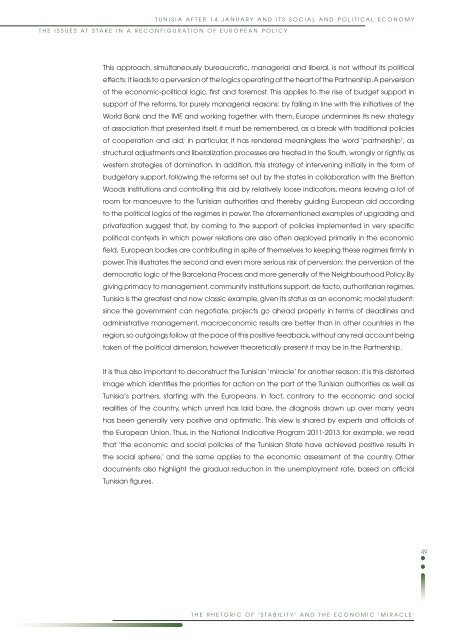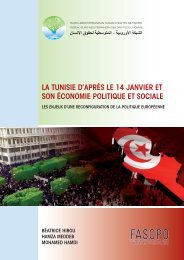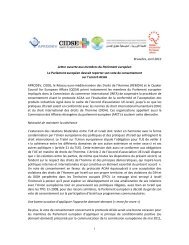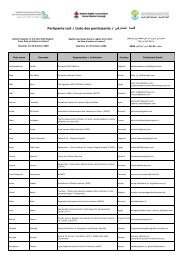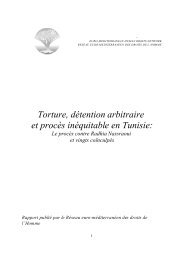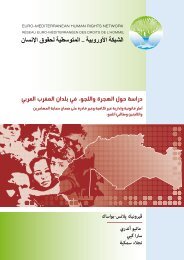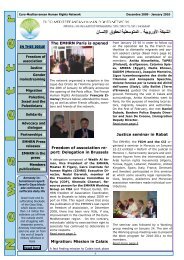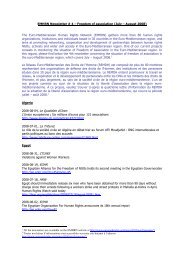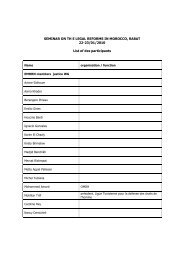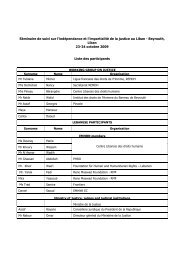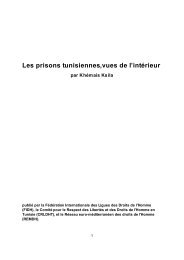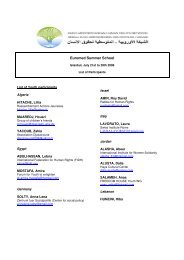tunisia after 14 january and its social and political economy - Refworld
tunisia after 14 january and its social and political economy - Refworld
tunisia after 14 january and its social and political economy - Refworld
Create successful ePaper yourself
Turn your PDF publications into a flip-book with our unique Google optimized e-Paper software.
T U N I S I A A F T E R 1 4 J A N U A R Y A N D I T S S O C I A L A N D P O L I T I C A L E C O N O M YT H E I S S U E S A T S T A K E I N A R E C O N F I G U R A T I O N O F E U R O P E A N P O L I C YThis approach, simultaneously bureaucratic, managerial <strong>and</strong> liberal, is not without <strong>its</strong> <strong>political</strong>effects: it leads to a perversion of the logics operating at the heart of the Partnership. A perversionof the economic-<strong>political</strong> logic, first <strong>and</strong> foremost. This applies to the rise of budget support insupport of the reforms, for purely managerial reasons: by falling in line with the initiatives of theWorld Bank <strong>and</strong> the IMF, <strong>and</strong> working together with them, Europe undermines <strong>its</strong> new strategyof association that presented <strong>its</strong>elf, it must be remembered, as a break with traditional policiesof cooperation <strong>and</strong> aid; in particular, it has rendered meaningless the word ‘partnership’, asstructural adjustments <strong>and</strong> liberalization processes are treated in the South, wrongly or rightly, aswestern strategies of domination. In addition, this strategy of intervening initially in the form ofbudgetary support, following the reforms set out by the states in collaboration with the BrettonWoods institutions <strong>and</strong> controlling this aid by relatively loose indicators, means leaving a lot ofroom for manoeuvre to the Tunisian authorities <strong>and</strong> thereby guiding European aid accordingto the <strong>political</strong> logics of the regimes in power. The aforementioned examples of upgrading <strong>and</strong>privatization suggest that, by coming to the support of policies implemented in very specific<strong>political</strong> contexts in which power relations are also often deployed primarily in the economicfield, European bodies are contributing in spite of themselves to keeping these regimes firmly inpower. This illustrates the second <strong>and</strong> even more serious risk of perversion: the perversion of thedemocratic logic of the Barcelona Process <strong>and</strong> more generally of the Neighbourhood Policy. Bygiving primacy to management, community institutions support, de facto, authoritarian regimes.Tunisia is the greatest <strong>and</strong> now classic example, given <strong>its</strong> status as an economic model student:since the government can negotiate, projects go ahead properly in terms of deadlines <strong>and</strong>administrative management, macroeconomic results are better than in other countries in theregion, so outgoings follow at the pace of this positive feedback, without any real account beingtaken of the <strong>political</strong> dimension, however theoretically present it may be in the Partnership.It is thus also important to deconstruct the Tunisian ‘miracle’ for another reason: it is this distortedimage which identifies the priorities for action on the part of the Tunisian authorities as well asTunisia’s partners, starting with the Europeans. In fact, contrary to the economic <strong>and</strong> <strong>social</strong>realities of the country, which unrest has laid bare, the diagnosis drawn up over many yearshas been generally very positive <strong>and</strong> optimistic. This view is shared by experts <strong>and</strong> officials ofthe European Union. Thus, in the National Indicative Program 2011-2013 for example, we readthat ‘the economic <strong>and</strong> <strong>social</strong> policies of the Tunisian State have achieved positive results inthe <strong>social</strong> sphere,’ <strong>and</strong> the same applies to the economic assessment of the country. Otherdocuments also highlight the gradual reduction in the unemployment rate, based on officialTunisian figures.49T h e r h e t o r i c o f ‘ s t a b i l i t y ’ a n d t h e e c o n o m i c ‘ m i r a c l e ’


